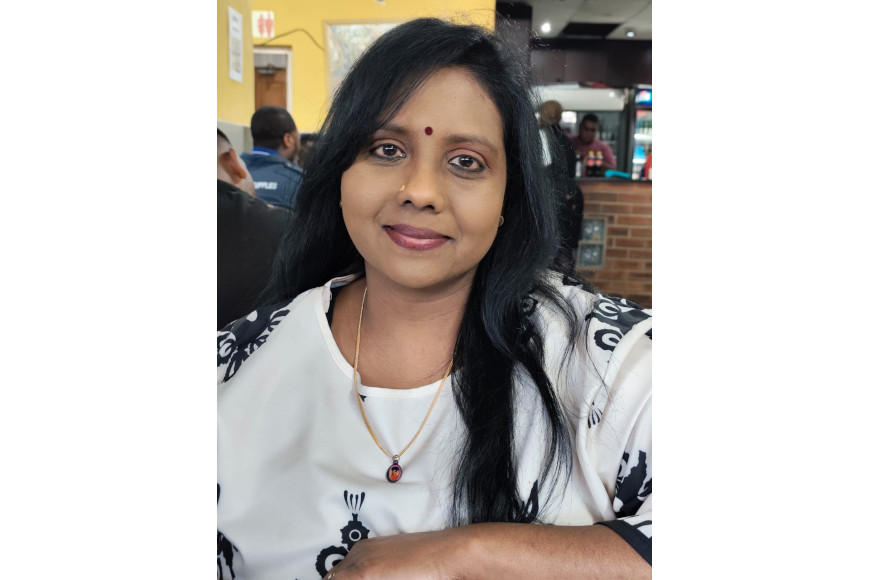Professor Vasanthrie Naidoo is ecstatic to be the only South African academic invited to participate in the Distinguished Professor Programme-2025 at Parul University, India from 30 August 2025 to 30 September, 2025.Parul University, located in Vadodara, Gujarat, is a prominent university with a diverse international student population. The university boasts over 3,500 international students from more than 75 countries among its student population and this year, is playing host to 80 visiting faculty members from various countries around the globe.
The Distinguished Professor Programme is an esteemed initiative designed to bring together accomplished educators, researchers and leaders to engage in collaborative discussions, inspire new ideas and to contribute to the academic enrichment of the global university community.
Professor Naidoo is currently holding the position of Associate Professor in the Department of Nursing, Faculty of Health Sciences. Her academic journey spans over three decades in health sciences education, research, health services management and critical care nursing. She has published widely such as transnational nursing education, higher education and health systems strengthening and ICU nursing. Prof Naidoo currently supervises doctoral and master’s students, and coordinates and teaches postgraduate research.
Describing how she feels upon receiving the invitational letter from the Parul University, Professor Naidoo shared that it is truly an honour to not only represent the Durban University of Technology (DUT) in this prestigious programme. “While I recognise this opportunity as a personal milestone as a female Nursing academic, it bears testament to the quality of research and academic excellence we strive for at DUT,” she said.
Prof Naidoo highlighted that Health Sciences is a dynamic faculty with many disciplines where most of her research related to Health Service Management, Leadership and Health Sciences Education is of an interdisciplinary nature. Recently she has collaborated and published on projects that vary from artificial intelligence in cardiology, stem-cell research in diabetes management to cultural diversity in healthcare. “What is significant to note is that, most of my research is inspired by my professional background in critical care and wanting to strengthen the ailing health systems we are faced with. Notably, the recent pandemic in particular, has reinforced the urgent need for responsive, innovative approaches from the healthcare sector related to health sciences education and healthcare service delivery, which now underpins much of my research projects,” she explained.
Having her research align with the objectives as outlined in the DUT ENVISION2030 strategy is a very strong component where it prioritises building human capacity through postgraduate supervision and mentorship, promoting social good by addressing inequities in health and education, and advancing innovation through curriculum-design and international collaboration.
“By integrating transdisciplinary approaches, my work supports DUT’s vision of being an engaged university that makes a positive impact both locally and globally. All of this is very much a part of DUT’s stewardship, systems and processes, society and sustainability strategies.
Prof Naidoo emphasised that her recent research on digital inequality in African higher education institutions has highlighted the structural and pedagogical barriers faced by students in resource-limited settings. “These findings inform strategies for more equitable access to digital learning, which is crucial in shaping inclusive educational policies. Additionally, my collaborative work on the use of adipose-derived stem cells for diabetic foot ulcer treatment offers promising therapeutic possibilities that could significantly improve patient quality of life,” she noted.
She further highlighted that she through the Distinguished Professor Programme, she intends to contribute to a global network of academia by fostering collaboration, sharing knowledge that addresses global health challenges.
“We are fast approaching 2030 which is the deadline for global achievement of the Sustainable Developmental Goals (SDGs), and initiatives like this help us as academics to network and promote global dialogue that will help steer the world to achieving these SDGs, particularly SDG 3 and 4, which is good health and well-being and quality education respectively. We also know that these two goals are deeply interconnected, with progress in one significantly impacting the other. Therefore, learning from global best practices can inform future research and inspire future collaborative projects that can influence health and education policy development in South Africa and beyond,” she expressed.
As academics Prof Naidoo indicated that there is a dire need to be cognisant of the fact that besides teaching and learning and community engagement, the third pillar that anchors any HEI is research.
“I have realised long ago that collaboration is central to my research philosophy, especially in academia. Interdisciplinary collaboration, partnerships within the healthcare industry, healthcare institutions and other HEIs have helped to ensure that my research remains relevant and impactful in real-world contexts,” she added.
Prof Naidoo is fortunate to have research collaborations with local, national and international partners within South Africa, Saudi Arabia, Sweden and India, but every research project becomes new and exciting as the aim is to try and make a difference to society. “I hope that this opportunity will help me extend these networks to strengthen research outputs, joint publications, and student and staff exchange opportunities,” she said.
For Prof Naidoo, being able to participate in this programme like this, provides the ideal platform to foster long-term collaborations, attract international research funding, and help DUT maintain a strong international presence on the global Higher Education stage.
“Whether we like it or not, we are living in an interconnected world and are continuously learning from each other and with each other. This is what helps us grow as individuals, and shapes society as a whole. So, while international academic visits can expose academics and researchers to different contexts and methodologies, they also help strengthen institutional reputations,” she concluded.
Pictured: Professor Vasanthrie Naidoo.
Waheeda Peters

